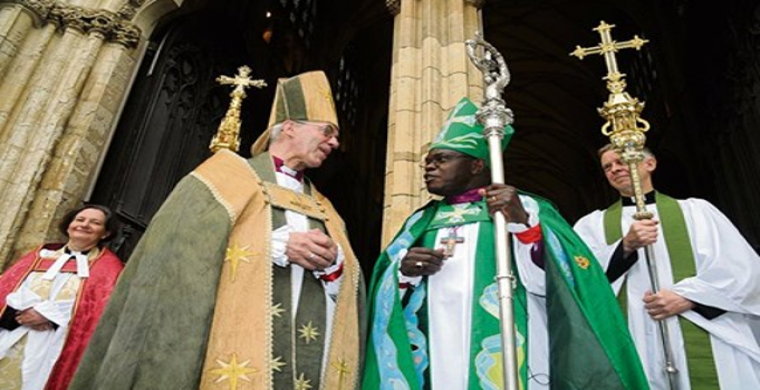Archbishops unveil 'urgent' reform programme for CofE
by Madeleine Davies
http://www.churchtimes.co.uk/
January 12, 2015
DETAILS of a "major programme of renewal and reform" of the Church of England have been released by the Archbishops of Canterbury and York.
They include a push to more candidates for ministerial training, and an overhaul of funding, with the aim of ensuring that it reflects "a bias to the poor and a commitment to spiritual and numerical growth".
The urgency of the challenges facing the Church is emphasised twice in the note. It is possible that the Commissioners will consider drawing on capital reserves to fund the reforms. Currently, all funds from the Commissioners derive from the interest generated on investments.
The plans have been developed by four task groups. They were commissioned by the Archbishops a year ago to explore four areas of the Church's life: "the discernment and nurture of those called to posts of wider responsibility"; resourcing ministerial education; the deployment of resources; and simplification.
The groups are chaired by Prebendary the Lord Green; the Bishop of Sheffield, Dr Steven Croft; John Spence; and the Bishop of Willesden, the Rt Revd Pete Broadbent. The Green report was published last month amid widespread criticism (News, 12 December). The remaining reports are to be released over the course of this week, before discussion by the General Synod next month.
The note from the Archbishops, published on Monday, speaks of the "urgency" of the challenges that the Church faces. These include diminishing congregations - attendance has declined by, on average, one per cent a year over recent decades - with an age profile "significantly" higher than that of the general population, and ordination rates "well below" those needed to replace the 40 per cent of the parish clergy who are due to retire in the next ten years.
The current reliance on an increase in individual giving to keep financially afloat is not sustainable, it warns. "The burden of church buildings weighs heavily and reorganisation at parish level is complicated by current procedures."
The Sheffield formula, introduced after the 1974 Sheffield report to determine targets for the number of stipendiary priests in each diocese, and taking into account congregation size, population, area, and number of church buildings, is "no longer generally observed".
The distribution of funds under the Darlow formula (used since 2001 to allocate national funding to dioceses with the fewest resources to assist with their stipends bill) has "no focus on growth, has no relationship to deprivation and involves no mutual accountability".
The task groups' reports will be published in full in the coming days, but recommendations will include a commitment to "a significant and sustained increase in the numbers of those coming forward for full-time ministry" and new investment in lay ministry.
Funds allocated nationally will have "a bias to the poor and a commitment to spiritual and numerical growth". The Darlow formula will be replaced with one based on population, income, and deprivation levels, and there will be a new funding stream available for growth initiatives.
The simplication report is to remove "hindrances to mission in relation to pastoral reorganisation and clergy deployment".
The note states that, were current funding limitations to remain in place, it would take a "long period" before the impact of the reforms were seen. The Church Commissioners, however, have produced a report that "opens up the issues around whether, for a period, they might be prepared to modify the way in which they currently seek to ensure inter-generational equity when determining what level of funding to make available from their permanent endowment".
The four Task Group reports and the report from the Commissioners will be discussed at the Synod "in the light of a paper that explores what it means for all Christians, lay and ordained, to be a community of missionary disciples".
As well as a presentation on the first evening, there will be group work and debates on four motions by the Ministry Council (on discipleship), the Archbishops' Council (on resourcing the future and resourcing ministerial education), the Church Commissioners (on inter-generational equity), and one on simplification.
The Archbishops' note states that the motions will focus on "vision, principles and next steps. Further development is still needed on some of the proposals and consultation required on many of the detailed outworkings before the relevant bodies, which on matters involving legislation includes the Synod itself, can reach conclusions." It expresses a hope that Synod members might "be prepared to resist the temptation to overload the motions with a large number of amendments on points of detail".
The reports, the note says, have been prepared "in the light of the supportive discussions at the Archbishops' Council, the House of Bishops, and the Board of Governors of the Church Commissioners".
In the wake of criticism of the Green report, the Archbishop of Canterbury promised that there would be "opportunities for people to engage with and comment on the proposals" (News, 19 December). But he warned that "We can't simply go on as we are if we are to flourish and grow as the Church of England. Our call is not to manage decline."














